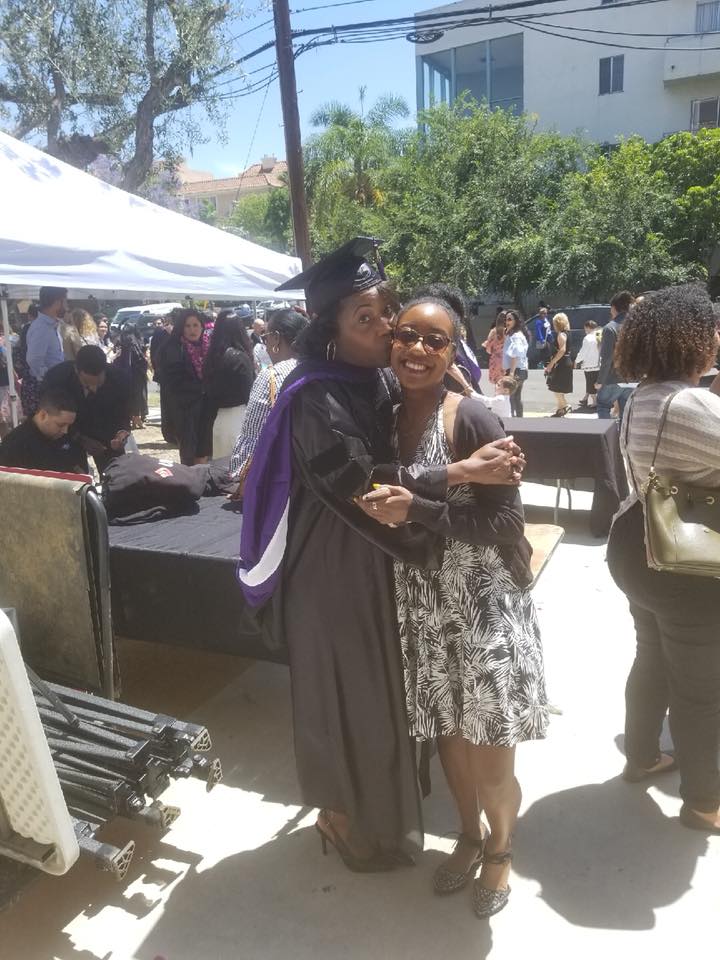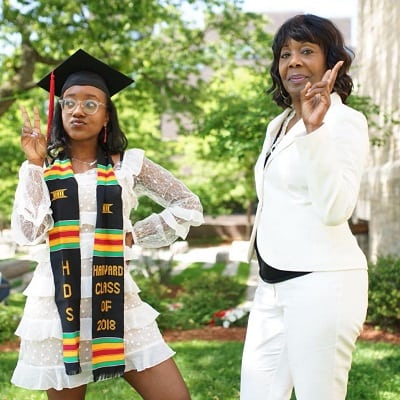
Cheryl Brown kisses daughter Nicole Powell following her commencement ceremony. PHOTO COURTESY NICOLE POWELL
The 2018 graduation season was doubly special for Cheryl Brown and Nicole Powell. Nicole, 22, earned a graduate degree from Harvard Divinity School and, days later, watched her mom, Cheryl, receive a Juris Doctorate from University of West Los Angeles School of Law. We caught up with the dynamic duo to talk social activism and their plans to help change the lives of the underserved throughout the city – and beyond.
How did it feel to celebrate two major accomplishments together?
Nicole: It was awesome. I’m proud of my mom for working hard and sticking to her goals and earning her degree after 22 years.
Cheryl: The timing was very special. We celebrated with a great soul food lunch.
Cheryl, you grew up in L.A.’s Crenshaw District (also affectionately known then as “The Avenues”). When did you come to understand your connection to your community and pass it on to Nicole?
After Martin Luther King Jr. was killed, bits and pieces of activism leaked out. My mother listened to Malcolm X albums and speeches. It prepared me when I entered the University of California Irvine in the early ’80s. The first day on campus, we found “anti-affirmative action” leaflets from a right-wing organization [that was] upset we were there. Thankfully, the black faculty was a strong force. They rallied around the black students and let us know we belonged there. The village “model” reaffirmed my sense of self. I knew that a similar model to uplift and affirm Nicole was crucial for her to succeed in settings where she may be “the only” brown face in classrooms or other settings.
Nicole, you initially considered a journalism career, but an internship with the Children’s Defense Fund Freedom Schools changed your path. Is that what led you to Harvard Divinity School?
I’m still interested in journalism and writing, and publish a lot of my midterms and final papers on [a website called] Medium. I now use journalism as a tool for social change. I was led to Harvard Divinity School because of its strong push for creating ethical leaders. I believe this degree will allow me to look at what motivates communities and drives policies from a unique perspective. Harvard is often seen as a place of great wealth and prosperity, but many students skip meals and cut corners just to survive. This, consequently, makes it harder to study and concentrate in classes.
How did you address the issue on campus? And what other issues did you work on?

Days after Nicole Powell (above left) received her degree from Harvard Divinity School, her mother (at right) received her Juris Doctorate from the University of West Los Angeles School of Law. PHOTO COURTESY NICOLE POWELL
Three other female students and I created an organization called Low Income Student Advocates to address low-income students’ needs. This included a monthly free clothing swap and a permanent food locker and refrigerator. I also served as president of the Prison Education Project (PEP) that tutors [incarcerated] students attaining their bachelors’ degrees at Boston University. Through PEP, I built relationships with community members on the inside and uplifted their perspectives and voices by reading their statements, articles and works in conferences and on panels.
Cheryl, what do you most admire about Nicole? Have you two always been close?
I was a hovering mother, but I’ve learned to step back. Nicole has faith in God and makes good decisions. I admire her kindness, sincerity, humility and her discipline, too. She’s grown up to be a lovely human being. That makes me most proud.
Nicole, what lessons did your mom teach you that have stuck with you most?
To be “humbly proud,” and that my strength comes from knowing historically how strong our ancestors were. We someday will be ancestors to our descendants and heirs, and we want to leave a legacy and make them proud. I’ve always remembered that. It’s probably why my life evolved into one of service.
What’s next for you both?
Nicole: A fellowship at Los Angeles County as a homelessness policy fellow working to build bridges between policymakers and community members to ensure their voices are incorporated into [legislation] around affordable housing and minimum wage. I’ll also be working with faith leaders to help them convert some of their spaces into temporary shelters for houseless community members.
Cheryl: In three years, I will be eligible for full retirement after 27 years with L.A. Metro. My goal afterwards is to provide service in a legal capacity to students with special needs by working with parents and the school district to ensure they have access to free appropriate education benefits.


























